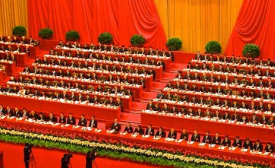china
In Maputo, the “Garden for Sculptors” behind the Museu Nacional de Arte on Avenida Ho Chi Minh has become a kind of prison yard for Mozambique’s various Ozymandiases, a semi-public dumping ground where colonial monuments now crumble quietly away. A marble European baroness reclines in thick robes, the grasses growing up around her base.
Since the beginning of the 21st century, China has been a rising star in the arena of public diplomacy. Its PD campaign, coordinated by the Ministry of Foreign Affairs, involves fourteen separate Departments, including the United Front Work Department, the Ministry of Commerce, the Ministry of Culture, and the General Administration of Press and Publication.

Since the beginning of the 21st century, China has been a rising star in the arena of public diplomacy. Its PD campaign, coordinated by the Ministry of Foreign Affairs, involves fourteen separate Departments, including the United Front Work Department, the Ministry of Commerce, the Ministry of Culture, and the General Administration of Press and Publication. [1] The colossal campaign aims to brand China as a responsible, peace-loving, and culturally sophisticated nation.
In 2013, Indonesia hosted the Asia Pacific Economic Cooperation (APEC) leadership meeting. Established in 1989, APEC has 21 member states that are committed to promoting trade and economic cooperation in the region. The summit was overshadowed by the absence of President Obama, who canceled his trip to manage the partial U.S. government shutdown.
Psy, the K-pop sensation and king of YouTube views, achieved an uncommon level of success in the West. While he may be the best example of an Asian pop singer breaking through the so-called “bamboo ceiling,” Asian artists face an uphill struggle attracting support from English-speaking fans.
Prime Minister Shinzo Abe said China’s continued economic growth will require building trust, not tensions, with other countries, according to an interview broadcast on Sunday. A steady Chinese military buildup over the last 20 years is a serious concern for countries in the region, Abe said in a CNN interview from Davos, Switzerland, where tensions between Tokyo and Beijing were on display at the World Economic Forum last week.
It wasn't a reassuring moment. Speaking at the World Economic Forum in Davos, Switzerland on Wednesday, Shinzo Abe, the Japanese prime minister, compared recent tensions between China and Japan to the rivalry between the British and German empires at the start of the 20th century.
He may be an award-winning satirist in the United States, but in China, even Stephen Colbert is not beyond parody: A provincial TV channel in the country has produced a show that borrows rather liberally from the popular American program. The Banquet, broadcast on Ningxia Satellite TV, lifted the entire opening credits and other graphics from The Colbert Report.







